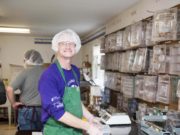Working in a Philadelphia HIV clinic, Brianna Wronko was struck by the difficulties patients had getting results. Patients were getting lost in the system, and myriad delays and complications often followed when they were required to go to an outside lab for tests.
In one case, a pregnant HIV-positive woman needed her liver function tested, but without results, doctors were unable to adjust her medication before she left the clinic. Although they discovered that the patient required further care, they were unable to reach her for six months. By then, harmful complications had developed.
It was a window into a vast problem.
Diving deeper, Wronko discovered that two-thirds of clinical decisions are based on lab results. Yet a staggering 77 percent of abnormal results are never communicated to patients. And seven percent are never even read by a healthcare provider.
“The long care chain and amount of time, as well as the increasing costs of diagnostics, make this one of the forefront problems in our healthcare system,” says Wronko.
So in 2016, while still a bioengineering student at the University of Pennsylvania, she set out to find a solution.
“I decided to do more than just publish my research,” she recalls. “[I] started the entrepreneurial pathway to commercializing a technology with the ultimate goal of helping patients.”
Her senior design project was a first pass at the diagnostics platform she had been mulling. Now, less than a year after graduation, she is CEO and founder of Group K Diagnostics. The company is developing a low-cost, point-of-care, paper-based system that can deliver results in minutes using blood, urine or sputum samples.
As its website explains, “Group K’s multi-diagnostic device is used in conjunction with software that that allows the diagnostic results to be read with no human error. By simply taking a picture, our software used on an iOS phone translates color to actual quantitative results in seconds.”
Those quick results at the point-of-care allow healthcare providers to take immediate therapeutic action.
“Providers will no longer face the risks associated with delayed results such as losing contact with a patient or not altering a care plan on time,” the company says.
Group K is gearing up for clinical trials with Penn Medicine, using resources from the health system’s research blood bank and conducting a patient study run in its Liver Disease Clinic; the company expects FDA approval by the end of the year for liver function testing. Other tests are in the R&D pipeline, including the comprehensive metabolic panel frequently ordered during physicals.
In September, Group K took up residency at the University City Science Center’s Port Business Incubator.
“We had been searching for lab space for a long time,” recalls Wronko. “[We] found a home at the Science Center because of its amazing facilities, great resources, and supportive environment.”
She’s bullish on Philadelphia, too.
“I think there’s far greater opportunities in the area right now than challenges,” she adds. “You have access to several amazing universities and medical centers, as well as a community of other wonderful health care-focused startups.”
This article originally appeared on CityWide Stories.
WRITER IN RESIDENCE is a partnership between the University City Science Center, Keystone Edge and CityWide Stories that embeds a reporter on-site at Quorum, the Science Center’s clubhouse for entrepreneurs at 3711 Market Street. The resulting coverage will provide an inside look at the most intriguing companies, discoveries and technological innovations coming out of this essential Philadelphia institution.



